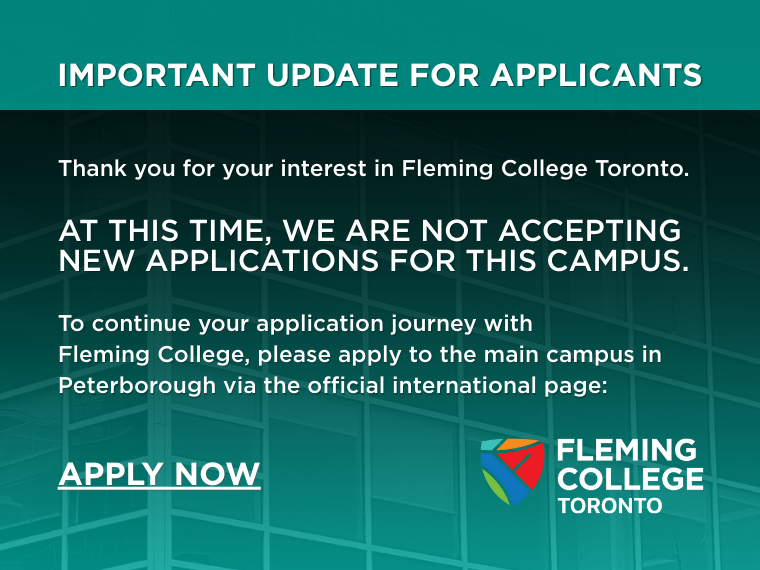VisionXChange: The Past, Present and Future of Artificial Intelligence
- December 21, 2023
- Career

Reading Time: 7 Minutes
Fleming College Toronto recently held its first VisionXChange seminar. The goal of these events is to bring together FCT students, staff, and industry professionals, to discuss various topics in business. In this iteration of the event, the relevant and topical issue of artificial intelligence was the main point of discussion.
In this blog, we summarize the main talking points surrounding AI that our guest speakers discussed. This includes the foundations of AI, its past and present, its impact on business, and the ethical questions surrounding AI.
Adam Balwant - What is AI?
What exactly is Artificial Intelligence? Our first speaker, Adam Balwant answered that question. Adam is a leading expert in the field of AI, an entrepreneur, and a College Professor of Entrepreneurship & Digital Innovation.
In his speech, Adam gave us an introduction to what AI is and discussed common misconceptions and concerns surrounding AI. Adam also mentioned that AI has been around for many years and was previously utilized by companies such as IBM and Apple. He explained that it has only recently begun to be widely discussed due to the rise of popular tools such as ChatGPT.
Adam discussed several key capabilities of AI, including personalization, research, and scheduling. He said that the best results of using tools like ChatGPT come from using the tool as an assistant to improve engagement and create content for your job or business, rather than relying completely on it.
Other ways to utilize AI include crafting resumes for specific jobs, reviewing essays, and writing in different languages. You must not use AI tools to author essays themselves. The results are dependent on the prompts you give the application, and the use of the tool will become obvious because of the change in structure and heavily repeated keywords. It is recommended that you use AI to build a foundation and brainstorm ideas but use your human touch to create the content. In addition, it is important to remember that the more detailed your prompt is, the better the results will be.
The foundations of AI were established years ago, but it continues to develop to this day. With tools like Chat GPT becoming increasingly prevalent, it is important to know how to utilize them effectively.
Chat GPT Alternatives
There are also several ChatGPT plug-ins and alternatives that can help you improve your work. Alternatives to ChatGPT include Beautiful AI, HyperWrite, and PlusAI, which can help you effectively build presentations and reduce the amount of time spent on tasks.
Adam said that AI will not replace humans in the workplace, but that humans with AI knowledge will replace other humans. As a result of this, a deep understanding of AI will be vital to being an efficient and productive worker in the coming years. In addition to being prepared to use AI for events, it is important to remember the ethical implications that come with using AI in business.
Kevin Derman- Using AI in Business
The next speaker, Kevin Derman, discussed the hot topic of using AI in business and how it fits into the current landscape. Kevin has worked in IT for over 25 years and advocates for the potential that AI can bring to business interactions. Kevin explained that ChatGPT’s recent rapid growth and expansion is largely due to its free-to-use nature and social media relevance. Machine learning, generative AI, and Deep Learning are a few examples of types of AI that are currently popular in business.
Kevin said that AI will help us with personalization in work and generate millions in revenue for various industries. He predicted that generative AI will greatly impact the global economy, as nine out of ten businesses have expressed interest in investing in AI. There are several benefits to artificial intelligence in many different types of business, though guidelines are also necessary.
Kevin stressed that as AI moves forward you need to decide if you are going to be fearful of the tool or utilize AI within your business. Using these new tools and being curious will help you stay ahead of the curve and ensure that AI is kept in check.
Danilo Souza – AI Growth and Its Impact on Employment
Danilo Souza has over 20 years of experience working in education and technology. An expert in digital planning, strategic planning, and innovation, he discussed AI's growth and its impact on employment.
Danilo discussed the history of AI as we know it, starting back in the 1950s. The first AI programs were developed as computers came into existence in the following decades. He explained that in the subsequent years, there was a huge amount of innovation, and after the 1980s, there was a significant increase in processing output from AI, including the first chatbot from IBM.
In the 21st century, we saw further developments in AI with devices such as the Roomba, and virtual systems released to the public. AI is expected to continue to grow exponentially over the next 10 years and have a significant impact on the way we work.
Impact on Employment
Between 300-800 million jobs are projected to be displaced by AI by 2030. However, AI will also create nearly 100 million jobs by 2025. In most cases, AI will not replace jobs outright but change them, and you will have to learn to adapt to working alongside those tools.
Danilo said that the top five industries that will be most affected include banking, insurance, software, capital markets and energy. Very soon, AI will be able to help you post both images and videos on social media, as generated content. As AI becomes more commonplace, it will have a considerable impact on work as we know it and become increasingly incorporated into our daily lives.
Future of Work
The future of work will be forever changed and shaped by AI and its ongoing growth. This means that everything the business world is focused on will include some element of using AI to improve productivity and reduce costs. As a worker, you must re-learn old skills, as well as gain new skills and knowledge about AI and new developments in AI technology. Soft skills will be critical, as everyone can use AI, but you will still need to go through a human to get something done.
It is often hard to find people qualified for AI skills as the pace of its development grows, so learning these skills will give you a distinct advantage. Overall, the growth of AI will have massive impacts and lead to some job displacement but also lead to new jobs for those willing to learn, take risks, and think critically and ethically.
Rubil Dhamija – The Ethics of AI
Utilizing his background working in IT, Rubil’s presentation focused on the ethical challenges that AI presents as it is used in business. He discussed the importance of addressing bias and fairness when using AI. In addition, he talked about the vitality of data privacy and security and maintaining transparency and accountability in AI decision-making.
Rubil also discussed strategies for ethical AI use, including transparency, inclusivity, and stakeholder engagement, all of which are key for offering insights into navigating the complex ethical landscape of AI in the business world. As these tools become increasingly advanced, it is important to learn about the ethical concerns and implications that go along with them and know how to adjust accordingly for the benefit of all workers.
Conclusion
The advent and rapid growth of AI can seem like a frightening prospect, but when we use it effectively, it can be an amazing tool for work, making the importance of artificial intelligence abundantly clear. As described by our guest speakers, AI’s rapid growth will not replace all jobs, but change them, so having a thorough knowledge of the history of AI, how it can be used in business, and its ethical implications is essential for workers going forward.
Read more blogs
From Türkiye to Toronto: Elifsu’s Journey as an International Student
Elifsu shares her story of being an international student and adjusting to life in Toronto.…
Student Perspectives: Navigating the Job Market with Career Services
Vankita talks about how she landed a job and adapted to workplace culture.…
5 Questions for Anurag Mathur, FCT Business Instructor
Get out of your comfort zone and open your mind with the help of our esteemed instructor…




